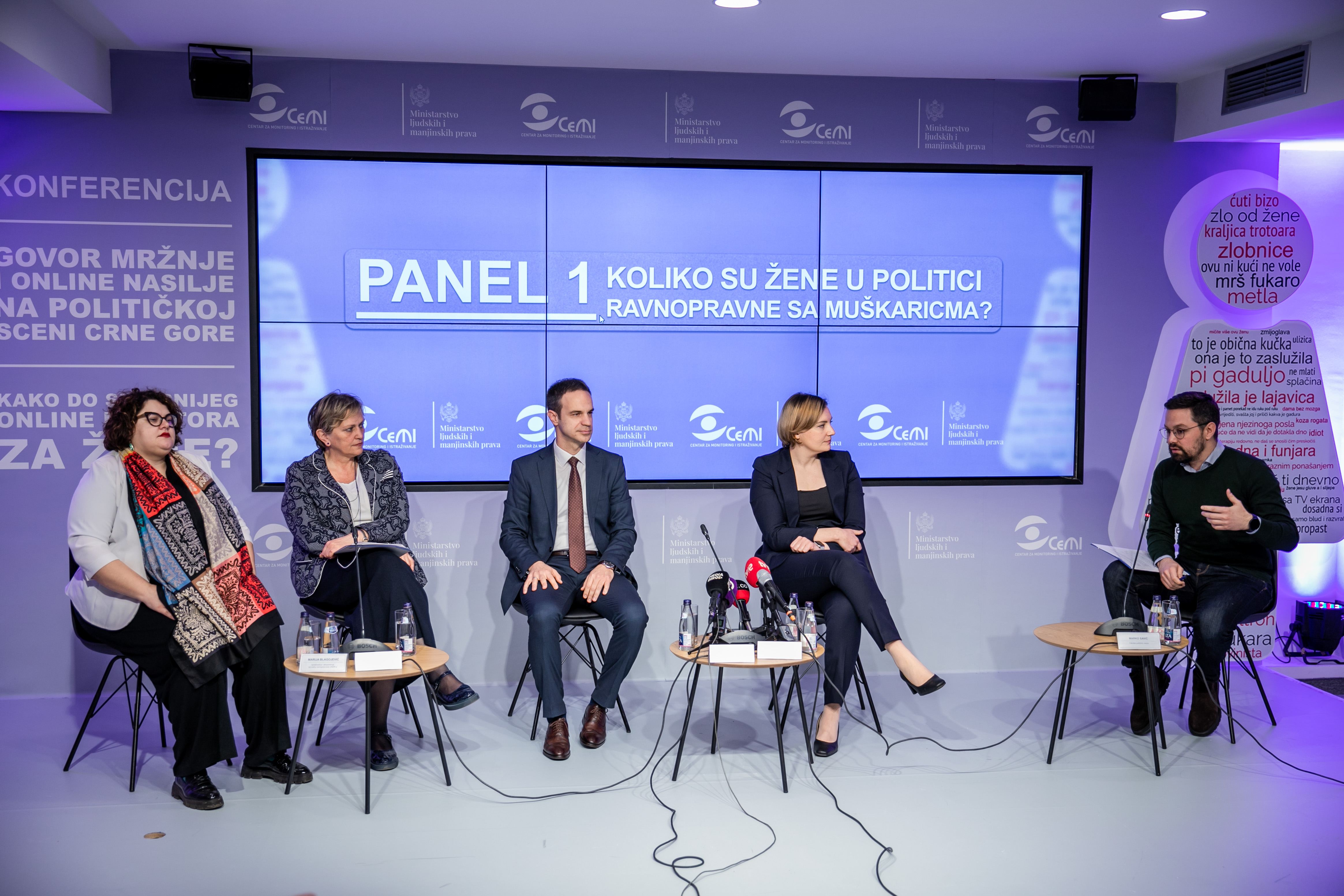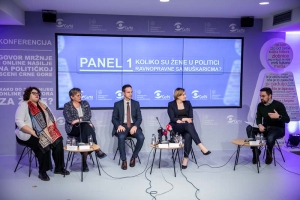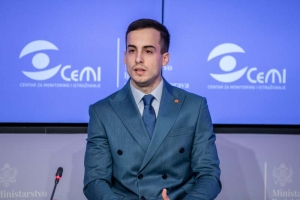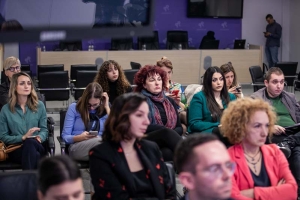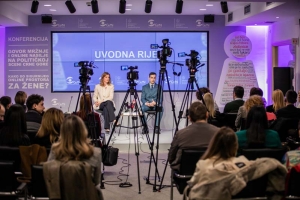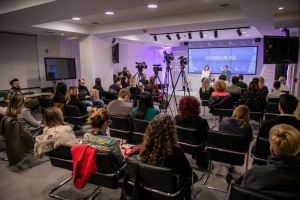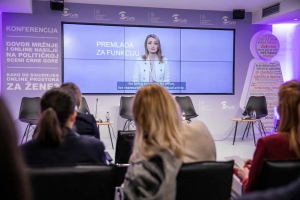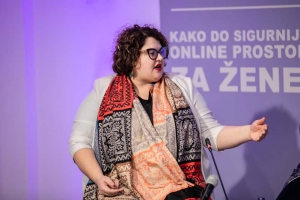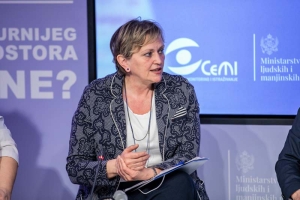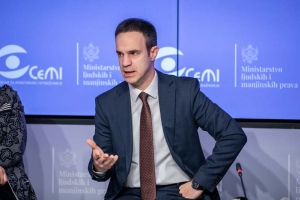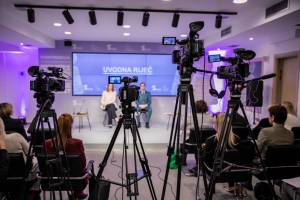In Montenegro, online violence against women in politics is an alarming problem that requires urgent attention and action, and for its suppression it is crucial to start from the education system, it was announced at the conference of the Center for Monitoring and Research (CeMI).
The program director of CeMI, Teodora Gilic, said at the conference "Hate speech and online violence on the political scene of Montenegro - How to create a safer online space for women?" that online violence against women in politics is an alarming problem that requires urgent attention and action.
"It represents a direct threat not only to women engaged in politics, journalism and other types of public-political engagement, but also to democracy itself." "The Internet and social media are increasingly being used to spread hatred, harassment, intimidation and threats to individuals, both men and women, who publicly express their political views and thus have become a serious challenge for our society," said Gilic.
According to her, it is not only a question of the safety of individuals, but also a question of the integrity of the political system and society as a whole.
"A systemic approach and cooperation of non-governmental organizations with other relevant actors is needed to ensure that women have the freedom to express themselves and participate in political life without fear of violence and discrimination." We must focus on education, empowering women to oppose these forms of violence, but also to develop mechanisms to fight against such forms of violence," said Gilic.
The representative of the Ministry of Human and Minority Rights of Montenegro, Matija Maksimovic, believes that it is very important to strengthen and ensure greater representation of women in political institutions or in the decision-making process, regardless of whether it is at the state or local level.
"Women in politics are the target of numerous misogynistic and sexist attacks, gender-based misinformation, gender-based hate speech, which results in discrediting and discouraging women from entering the political scene and thereby contributing to the creation of public policies in a better way," stated Maksimovic.
According to him, education can be used to raise awareness of the harmfulness of hate speech and its long-term consequences for society.
"It is necessary that the legal framework be strengthened in order to combat online violence more effectively. "Clear and stricter changes to the laws that regulate this kind of behavior will make it clear that society will no longer suffer discrimination and intolerance," Maksimovic said.
He assessed that technological platforms play a key role in combating online violence.
"Developing and applying effective algorithms for identifying and removing vulnerable content can significantly contribute to the creation of a safer digital environment." Each and every individual has the responsibility to promote positive dialogue and oppose any form of hate speech," said Maksimović.
During the first panel "How equal are women in politics to men?", member of the Committee on Human Rights and Freedoms, Drita Llolla, said that women face a lack of trust.
"Statistics show that politicians are not trusted to a large extent." An additional challenge you have as a woman is that even your male colleagues do not trust you. So you face double mistrust. There is no room for you to advance in politics," said Llolla
He believes that the political scene in Montenegro has been reduced to declarative advocacy for values and reduction to the personal.
"We need to join together in a joint action to change this narrative and to work on the destigmatization of women." "Violence does not come from the street, but from the assembly and the public stage, it spills over into society," said Llolla.
She assessed that very little space was given to women for decision-making in political parties and the Assembly of Montenegro.
Llolla also pointed out that the media further victimizes women and that they should work on that issue because of the significant role they play.
MP of the Social Democrats of Montenegro, Boris Mugosa, believes that the position of women in Montenegro is bad in the bronze segments.
"Women are discouraged from engaging in any public work in a number of ways. This is proven by any percentage of women in decision-making positions and in politics. I think that the problem in Montenegro is the substance of society. I am convinced that we do not have a sufficient percentage of people who think progressively, that is why we are a suitable ground for numerous retrograde policies", said Mugosa.
He assessed that the biggest challenge in Montenegro is a change of consciousness.
"Probably, certain steps are being taken, but they are very small." There is more and more misogyny. Social networks are a huge evil in this regard. I am particularly concerned about the lack of women's solidarity, and what worries me the most is the incorrect interpretation of the concept of feminism, which I have noticed lately is emerging as a negative phenomenon," said Mugosa.
He believes that it is necessary to take much more account of the dialogue in the Montenegrin Parliament, which, as he pointed out, represents a mirror of a society.
"I also think that we need to work much more on education. Through the education system, we develop the progressive character of the individual and his creativity," said Mugosa.
Expert and former president of the Committee on Gender Equality, Nada Drobnjak, reflected on the period from 2003 and her fight for women's rights.
"We had a legislative and institutional rise. We were the first in the region to standardize that not using gender-sensitive language is discrimination. We managed to enter the education system with the story of gender equality. A lot of work was also done on the economic empowerment of women," Drobnjak reminded.
She assessed that the big problem today is how to change the cultural context in which we live.
"I see the existence of gender stereotypes as the biggest obstacle in this process, with which we cannot fight," added Drobnjak.
According to her, it is always about the quality of women on the political stage, while this is not true for men.
"A woman must invest much more energy in proving herself, to deserve to be part of the political scene. "Every woman from the political scene, if she will honestly answer you whether she has experienced or reported violence, she will say yes," said Drobnjak.
She assessed that this kind of political scene does not encourage young women to be more active in politics.
"Also, social networks have polluted that space so much that I can understand a young woman when she tells me that she does not want to be involved in politics," said Drobnjak.
He believes that it is important to teach young people that there should be equal numbers of men and women in decision-making positions.
Drobnjak also assessed that the real power for change is the participation of women in political life in the Government of Montenegro.
Marija Blagojevic, a researcher and gender equality expert at the UNDP, said that at the global level and in Montenegro, we are witnessing resistance to human rights and the return of retrograde ideas.
"In Montenegro, we have a good legislative framework, we have certain mechanisms that we have established. In the institutional sense, we have a better situation than it was before. What persists are established gender stereotypes and gender roles, and this is easily proven by figures such as ten percent of assets in the name of women, not even half of them in the labor market," said Blagojevic.
She assessed that cultural patterns are the most difficult to eradicate.
"All the researches in the past five, six years show that the younger generations are more traditional and conservative than ours or our parents' generations." This speaks of a worrying trend, especially if you add to that the availability of everything on social networks," said Blagojevic.
She pointed to the UNDP study which showed that from 1946 until today, only 26 different women were in the executive power in Montenegro.
"When you consider how many women were in the Montenegrin parliament from 1946 until today, the figures show that out of 2,319 men and women, 246 were women, which is ten percent." Women were the majority in the population all that time," Blagojevic said.
The conference was held as part of the project "Contribution to the increase of female political activism in Montenegro", which is implemented by CeMI with the support of the Ministry of Human and Minority Rights of Montenegro.
